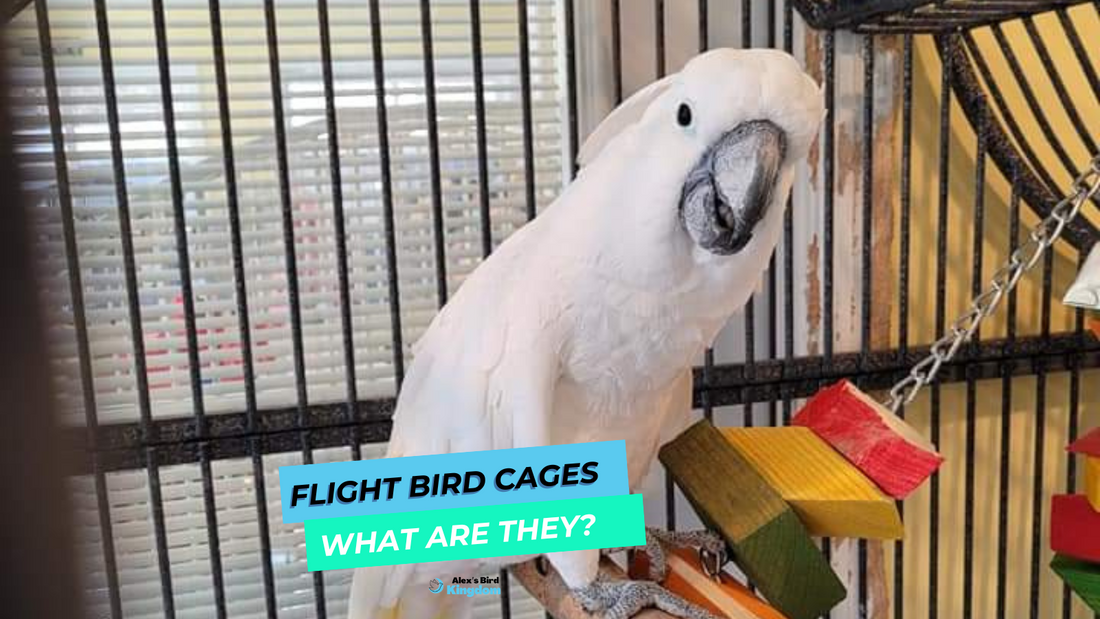Bird cages are essential for providing a safe and comfortable home for your feathered friend. The right cage gives your bird a secure place to rest, play, and exercise.
Flight cages are a great foundation, but toys and foraging activities provide the bird enrichment parrots truly need.

While researching cages, you’ve probably come across the term flight cage. But what exactly is a flight cage, and does your bird really need one? Let’s break it down.
What Is a Flight Cage?
A flight cage is a bird cage that’s large enough for a bird to fly around inside—not just a few wing flaps, but actual short flights.
These cages are designed to give pet birds the freedom to spread their wings, exercise, and explore. A flight cage encourages:
-
Natural flight and wing-flapping
-
Physical exercise to prevent obesity
-
Mental stimulation and enrichment
-
Happier, more content birds
Think of it as the next best thing to free flight. Even smaller parrots like cockatiels, conures, and parrotlets benefit from the extra room.

👉 Pro tip: Even with a large cage, your parrot still needs toys and enrichment to stay busy.
Many bird owners pair a flight cage with a Bird Fun Box by Alex — our monthly bird toy subscription box filled with handmade toys, treats, and activities to keep your feathered friend happy.
Why Flight Cages Are Good for Birds
Birds aren’t meant to sit still all day. In the wild, they fly miles at a time. While a home environment can’t replace that, a flight cage brings them closer to their natural lifestyle.
Cockatiels & cockatoos thrive in flight cages because they get both exercise and mental stimulation.
Inside a flight cage, birds can:
-
Flap their wings without hitting the bars
-
Play hide and seek between perches
-
Climb, swing, and hop freely
-
Explore toys and foraging activities
This freedom helps with both physical health (stronger muscles, healthier heart) and mental health (less stress and boredom).
A monthly bird toy subscription box (like the Bird Fun Box by Alex) adds variety, enrichment, and safe chewing toys to a cockatiel or cockatoo’s daily routine.
What Is the Ideal Size for a Flight Cage?
The right size depends on your bird and your space. Here are a few guidelines:
-
Small birds (finches, parakeets): A small flight cage can house several comfortably.
-
Medium birds (parrotlets, cockatiels, conures): Choose a large flight cage so they have plenty of space to fly and play.
-
Large parrots (African greys, amazons, macaws): Look for an aviary-style flight cage, often used outdoors, since they need significant room.
General tips:
-
Prioritize horizontal space (flying side-to-side) over vertical height.
-
Allow enough room for multiple perches and toys.
-
Keep bar spacing appropriate to prevent escapes.
-
Check materials — avoid cages with toxic metals like zinc or lead.
Keep in mind: flight cages take up more space in your home than traditional cages. A medium to large flight cage may need 5–8 square feet of floor space.
Final Thoughts
If you want your parrot to live a healthier, happier life, a flight cage is a fantastic choice. It gives them the space to move, fly, and explore — all essential for their well-being.
Just remember:
-
Choose the right size for your bird.
-
Make sure it’s safe and made with bird-friendly materials.
-
Add perches, toys, and foraging opportunities.
Because a spacious cage is great, but enrichment is what makes it complete.
That’s where the Bird Fun Box by Alex comes in — a monthly bird subscription box packed with handmade toys, treats, and bonding activities.
Perfect for cockatiels, conures, cockatoos,macaws, african greys, and more.
Give your bird both space and stimulation, they deserve it. Learn more here: Bird Fun Box











